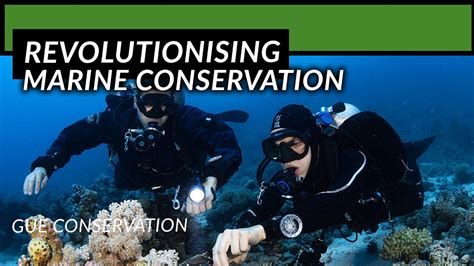The ocean has always been a source of fascination and mystery for humans. However, as our planet faces the challenges of climate change, pollution, and overfishing, it's becoming increasingly clear that we need to take action to protect our marine ecosystems. Fortunately, advances in eco-friendly technology (eco tech) are revolutionizing the field of marine conservation, offering new and innovative solutions to these pressing issues.
In recent years, there has been a surge in the development of eco tech designed specifically for marine conservation. From underwater drones to ocean-friendly packaging, these innovations are helping to reduce our impact on the ocean and promote the health of marine ecosystems.
Here, we'll explore five ways in which eco tech is revolutionizing marine conservation, and what this might mean for the future of our oceans.
The Rise of Underwater Drones

One of the most exciting developments in eco tech for marine conservation is the rise of underwater drones. These unmanned underwater vehicles (UUVs) are equipped with advanced sensors and cameras, allowing them to collect data on ocean health, track marine life, and even detect signs of pollution.
Underwater drones have numerous applications in marine conservation, from monitoring coral reefs to tracking the movements of marine animals. They can also be used to inspect offshore wind farms, oil rigs, and other underwater infrastructure, reducing the need for human divers and minimizing the risk of accidents.
For example, the National Oceanic and Atmospheric Administration (NOAA) has been using underwater drones to monitor the health of coral reefs in the Florida Keys. By using drones to collect data on water temperature, pH levels, and other factors, scientists can gain a better understanding of the impacts of climate change on these critical ecosystems.
Ocean-Friendly Packaging

Another area in which eco tech is making a significant impact is in the development of ocean-friendly packaging. Every year, millions of tons of plastic waste enter the ocean, harming marine life and contaminating the food chain.
To address this problem, companies are turning to innovative packaging solutions that are biodegradable, compostable, or made from sustainable materials. For example, some companies are using seaweed-based packaging that can replace traditional plastic packaging materials.
One company, Loliware, has developed a line of edible, compostable cups made from seaweed and other plant-based materials. These cups are not only biodegradable but also non-toxic and safe for marine life to ingest.
Marine Debris Removal

Marine debris removal is a critical component of ocean conservation, and eco tech is playing an increasingly important role in this area. From underwater cleanup systems to beach-cleaning drones, there are now many innovative solutions available for removing plastic waste and other debris from the ocean.
For example, the Ocean Cleanup Project has developed a system for removing plastic waste from the Great Pacific Garbage Patch, a giant vortex of plastic debris in the North Pacific Ocean. The system uses a floating barrier to collect plastic debris, which can then be removed from the ocean and recycled.
Artificial Reefs

Artificial reefs are another area in which eco tech is making a significant impact. These human-made structures are designed to mimic the characteristics of natural reefs, providing habitat for marine life and helping to promote biodiversity.
Artificial reefs can be made from a variety of materials, including recycled plastic, concrete, and even old ships. They can also be designed to provide specific benefits, such as reducing erosion or promoting the growth of coral and other marine organisms.
For example, the Reef Ball Foundation has developed a system for creating artificial reefs using recycled materials. The foundation's reefs have been deployed in oceans around the world, providing habitat for marine life and helping to promote biodiversity.
Monitoring Ocean Health

Finally, eco tech is playing an increasingly important role in monitoring ocean health. From satellite imaging to underwater sensors, there are now many innovative solutions available for tracking ocean conditions and monitoring the impacts of human activities on marine ecosystems.
For example, the National Aeronautics and Space Administration (NASA) has developed a system for monitoring ocean health using satellite imaging. The system, known as the NASA Ocean Color website, provides data on ocean color, temperature, and other factors, allowing scientists to track changes in ocean health over time.





As we've seen, eco tech is revolutionizing the field of marine conservation, offering new and innovative solutions to the challenges facing our oceans. From underwater drones to ocean-friendly packaging, these technologies are helping to reduce our impact on the ocean and promote the health of marine ecosystems.
As we move forward, it's essential that we continue to develop and deploy these technologies, working together to protect the ocean and all its inhabitants.
What is eco tech, and how is it being used in marine conservation?
+Eco tech refers to the use of technology to promote environmental sustainability and conservation. In marine conservation, eco tech is being used to develop innovative solutions such as underwater drones, ocean-friendly packaging, and artificial reefs.
What are some of the biggest challenges facing marine conservation, and how can eco tech help address them?
+Some of the biggest challenges facing marine conservation include pollution, overfishing, and climate change. Eco tech can help address these challenges by providing innovative solutions such as ocean-friendly packaging, sustainable fishing practices, and technologies for monitoring ocean health.
What role can individuals play in promoting ocean conservation, and how can eco tech help?
+Individuals can play a critical role in promoting ocean conservation by making sustainable choices, reducing their use of plastic, and supporting organizations working to protect the ocean. Eco tech can help individuals make more sustainable choices by providing access to innovative products and services that promote ocean conservation.
